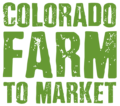Farmers’ Market and On-Farm Sales Tax Liability
State Sales Tax: Vendors do not need to collect state sales tax if the food is purchased from them for the buyer to consume at home. The state of Colorado exempts food for home consumption from being taxed.
County and city sales taxes: The city and/or county where the vendor sells his/her products may tax food. To check, visit the Colorado Department of Revenue website for Colorado Sales and Use Tax Rates. If you determine that the city and/or county does require you to collect sales tax on products you sell, check on the tax rate. Although the Department of Revenue makes every effort to keep its publications up to date, you should double-check with any city listed as “home-rule” to confirm rates of tax on food and their exemptions for it.
Although some farmers’ markets will pay your sales tax for you, based on your gross sales for the day, week or month, you still need to file a tax return to the state of Colorado’s Department of Revenue which collects taxes for most counties and municipalities (or in the case of home rule jurisdictions, to the taxing county or municipality). Check with each market to understand their policy with respect to sales taxes.
You must obtain a sales tax license for each location from which you have product sales. The Colorado Department of Revenue issues multiple site licenses. Once you have your license, you can check on which jurisdictions it covers and applicable tax rates at the Sales Tax License Verification System and Retailers’ Sales Tax Rates.
There are office locations you can visit for in-person assistance, visit Taxpayer Service Division Offices. For more information call (303) 238-7378.
Wholesale Tax Liability
State Sales Tax: A business selling only wholesale must have a sales tax license. The fee for a two-year license is $16. Standard sales tax accounts must be renewed every two years at a fee of $16. The two-year license is valid from January 1 of even-numbered years through December 31 of odd-numbered years. License fees are prorated in six-month increments during the two-year fee period.
Allow four to six weeks to receive a license in the mail. Apply for a license in person at one of the Taxpayer Service Centers to have a temporary license issued immediately. The actual license will then be sent within two weeks.
If a business plans to have employees, a Colorado wage withholding account must be established. Complete and submit the Sales Tax/Wage Withholding Account Application (CR 0100). There is no registration fee for a withholding account. More information on wage withholding.
Wholesalers shall be required to report and pay any sales taxes owed on the same basis as any other vendor, but a licensed wholesaler who makes no retail sales can submit a no-tax return on an annual basis. Businesses registered as wholesalers will receive one return in December with which to remit any taxes collected during the year on limited retail sales. Wholesale businesses with a sales tax liability of $180 per year or less can file annually. If sales tax liability exceeds $180 per year, a retail sales tax license is required.
County and city sales taxes: The city and/or county where the vendor sells his/her products may tax food. To check, visit the Colorado Department of Revenue website for Colorado Sales and Use Tax Rates. If you determine that the city and/or county does require you to collect sales tax on products you sell, check on the tax rate.
Mobile Cart Vendors (not at a farmers’ market) Liability
State Sales Tax: Businesses that sell goods via a mobile vehicle must obtain a sales tax license for the business. These businesses will pay the $16 license fee and $50 deposit.
County and city sales taxes: The city and/or county where the vendor sells his/her products may tax food. To check, visit the Colorado Department of Revenue website for Colorado Sales and Use Tax Rates. If you determine that the city and/or county does require you to collect sales tax on products you sell, check on the tax rate. A separate return must be filed for each jurisdiction where sales are made. Home rule areas must be contacted directly for rules and remittance procedures regarding mobile sales made within their jurisdictions.
Related Links:
